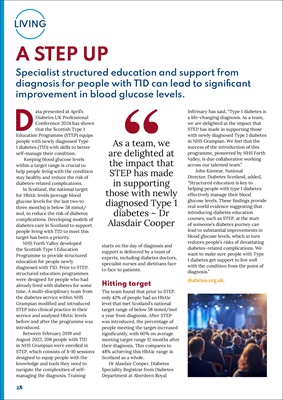
28
LIVING
As a team, we
are delighted at
the impact that
STEP has made
in supporting
those with newly
diagnosed Type 1
diabetes ~ Dr
Alasdair Cooper
A STEP UP
Specialist structured education and support from
diagnosis for people with T1D can lead to significant
improvement in blood glucose levels.
Data presented at April's
Diabetes UK Professional
Conference 2024 has shown
that the Scottish Type 1
Education Programme (STEP) equips
people with newly diagnosed Type
1 diabetes (T1D) with skills to better
self-manage their condition.
Keeping blood glucose levels
within a target range is crucial to
help people living with the condition
stay healthy and reduce the risk of
diabetes-related complications.
In Scotland, the national target
for HbA1c levels (average blood
glucose levels for the last two to
three months) is below 58 mmol/
mol, to reduce the risk of diabetes
complications. Developing models of
diabetes care in Scotland to support
people living with T1D to meet this
target has been a priority.
NHS Forth Valley developed
the Scottish Type 1 Education
Programme to provide structured
education for people newly
diagnosed with T1D. Prior to STEP,
structured education programmes
were designed for people who had
already lived with diabetes for some
time. A multi-disciplinary team from
the diabetes service within NHS
Grampian modified and introduced
STEP into clinical practice in their
service and analysed HbA1c levels
before and after the programme was
introduced.
Between February 2019 and
August 2022, 206 people with T1D
in NHS Grampian were enrolled in
STEP, which consists of 8-10 sessions
designed to equip people with the
knowledge and tools they need to
navigate the complexities of selfmanaging
the diagnosis. Training
starts on the day of diagnosis and
support is delivered by a team of
experts, including diabetes doctors,
specialist nurses and dietitians face
to face to patients.
Hitting target
The team found that prior to STEP,
only 42% of people had an HbA1c
level that met Scotland's national
target range of below 58 mmol/mol
a year from diagnosis. After STEP
was introduced, the percentage of
people meeting the target increased
significantly, with 60% on average
meeting target range 12 months after
their diagnosis. This compares to
48% achieving this HbA1c range in
Scotland as a whole.
Dr Alasdair Cooper, Diabetes
Speciality Registrar from Diabetes
Department at Aberdeen Royal
Infirmary has said, "Type 1 diabetes is
a life-changing diagnosis. As a team,
we are delighted at the impact that
STEP has made in supporting those
with newly diagnosed Type 1 diabetes
in NHS Grampian. We feel that the
success of the introduction of this
programme, pioneered by NHS Forth
Valley, is due collaborative working
across our talented team."
John Kinnear, National
Director, Diabetes Scotland, added,
"Structured education is key to
helping people with type 1 diabetes
effectively manage their blood
glucose levels. These findings provide
real world evidence suggesting that
introducing diabetes education
courses, such as STEP, at the start
of someone's diabetes journey can
lead to substantial improvements in
blood glucose levels, which in turn
reduces people's risks of devastating
diabetes-related complications. We
want to make sure people with Type
1 diabetes get support to live well
with the condition from the point of
diagnosis."
diabetes.org.uk.